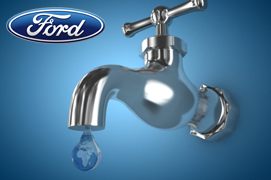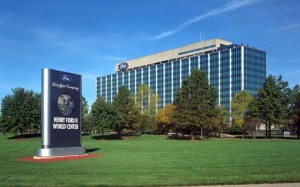Ford Motor Company has set a water reduction target in its manufacturing and assembly line processes of 30% per vehicle by 2015. The application of this policy governs every aspect of production. Manufacturing a car from beginning end including four tires and a spare consumes on average close to 190,000 liters (50,000 gallons) of water. Ford manufactures vehicles at 200 factories worldwide which produce close to 10,000 a day. So that means Ford’s typical daily water consumption for vehicle production equals 1.9 billion liters (500 million gallons) of water.
Ford is no stranger to committing the company to decrease water use. It began an initiative in 2000 setting a 3% annual reduction goal per year. The company since then has reduced total global water use by 62% or over 40 billion liters (10.6 billion gallons). Now the company is tracking water discharged from manufacturing plants with a goal to begin implementing gray water recycling programs. Ford sees reduction in water use at all stages of its manufacturing and supply chain as a way for it to contribute to lowering both its water usage and carbon footprint.
So where is all that water being used for vehicle production? Here are just a few of the areas where water use is significant:
- the steel and aluminum that makes up much of the body of vehicles;
- the fossil fuels used for vehicle parts, lubricants and fuel;
- the tires each consuming more than 4,000 liters or 1,000 gallons;
- the rinsing processes on the production line.
A growing number of companies are recognizing that climate risk management is extremely important. Companies in food and beverage, insurance, investment, technology and energy industries have created Business ADAPT which is part of the Value Chain Climate Resilience Guide, created by Acclimatise.
Business ADAPT provides a five-step guide to address climate change challenges. It helps companies identify climate-risks throughout their manufacturing and supply chain and develop internal strategies that can be implemented and measured. More importantly the tool has been designed to evolve to incorporate new methodologies and technologies as they emerge and incorporate them into reduction and mitigation processes.
So kudos to Ford and all the other companies that are taking freshwater scarcity and climate change seriously, seeing the importance of being good corporate citizens in the fight to reduce both their water and carbon footprints.











Wow, you mean dirty old Ford’s global operations are “consuming” 0.008% as much fresh water as the Amazon River is wasting into the Atlantic Ocean? Oh I almost forgot, Ford has huge plants in Brazil, I wonder where all that fresh water they “consume” winds up. It’s hard to believe this issue should be anywhere near the center of the global concerns screen.
What Ford is publicly announcing is at least an acknowledgement that as an industry leader they need to deal with freshwater usage as well as their carbon footprint. All businesses need to acclimatize to the reality of water scarcity and climate change.
((What Ford is publicly announcing is at least an acknowledgement that as an industry leader they need to deal with freshwater usage as well as their carbon footprint. All businesses need to acclimatize to the reality of water scarcity and climate change.))
Yes, but it’s just empty PR. The basic problem is overpopulation not fresh water shortage. Ford products contribute to the overpopulation problem. Ford is part of the probleml, not part of the solution. Nearly every product Ford makes increases demand for fossil fuel, and that increases demand for freshwater..
The problem as I see it is our focus on economic growth as the measure of our society’s progress. It shouldn’t be. Growth is what’s killing us. We make more things. We take more from the Earth. We give birth to more people. We need a new paradigm upon which to build our human society, one that is more in harmony with the planet.
What does that mean for the Ford Motor Companies of this world? How do you measure the intrinsic value a company provides by looking at more than its bottom line?
((Growth is what’s killing us.))
Yes, but it’s overpopulation that is driving the growth. It’s a positive feedback cycle; the growth drives overpopulation and the overpopulation drive the growth. Each new person that is born intends to enjoy his “fair share” of global production and consumption. Not one out of a hundred is ever going to reduce his consumption or limit his reproduction because his conscience is telling him he contributes to environmental degradation. Humanity doesn’t have the technological competence to support the present population without serious environmental degradation. The atmospheric CO2 burden will reach levels that trigger an avalanche release of polar region methane. If mankind won’t limit its numbers, nature will.
All the smart people see what’s coming, and they refuse to spend their last years before climate catastrophe making personal sacrifices frantically bailing down in the bilges. No, they are going to try to enjoy the final cruise in the first class ballroom and on the top deck. The wealthier ones will invest in comfortable survival sanctuaries in the remote Northern Canadian Rockies or the Scottish Highlands and figure the devil can take the hindmost of the rest.
You describe a doom and gloom scenario. I would hope, yes hope that smarter heads will soon prevail in our leadership, or that the grassroots will express their discontent in allowing the status quo to remain with all its attendant consequences. So I am hoping you are wrong in all your conclusions.